英语专业四级语法辅导1
- 格式:ppt
- 大小:181.50 KB
- 文档页数:40
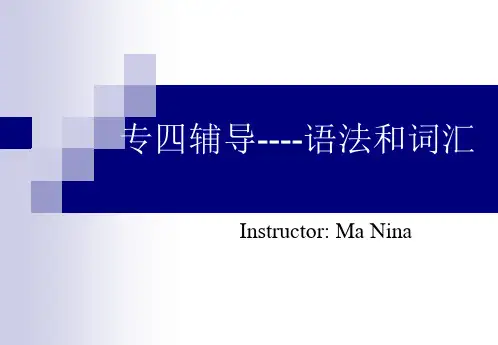
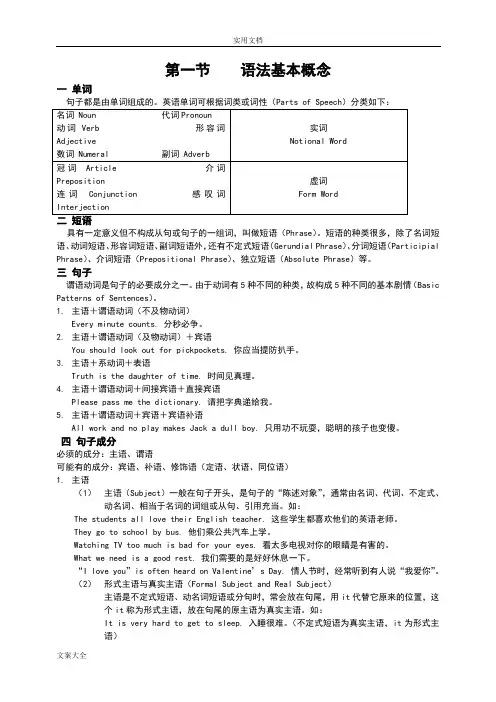
第一节语法基本概念一单词句子都是由单词组成的。
英语单词可根据词类或词性(Parts of Speech)分类如下:名词 Noun 代词Pronoun动词Verb 形容词Adjective数词 Numeral 副词 Adverb实词Notional Word冠词Article 介词Preposition连词Conjunction 感叹词Interjection虚词Form Word二短语具有一定意义但不构成从句或句子的一组词,叫做短语(Phrase)。
短语的种类很多,除了名词短语、动词短语、形容词短语、副词短语外,还有不定式短语(Gerundial Phrase)、分词短语(Participial Phrase)、介词短语(Prepositional Phrase)、独立短语(Absolute Phrase)等。
三句子谓语动词是句子的必要成分之一。
由于动词有5种不同的种类,故构成5种不同的基本剧情(Basic Patterns of Sentences)。
1.主语+谓语动词(不及物动词)Every minute counts. 分秒必争。
2.主语+谓语动词(及物动词)+宾语You should look out for pickpockets. 你应当提防扒手。
3.主语+系动词+表语Truth is the daughter of time. 时间见真理。
4.主语+谓语动词+间接宾语+直接宾语Please pass me the dictionary. 请把字典递给我。
5.主语+谓语动词+宾语+宾语补语All work and no play makes Jack a dull boy. 只用功不玩耍,聪明的孩子也变傻。
四句子成分必须的成分:主语、谓语可能有的成分:宾语、补语、修饰语(定语、状语、同位语)1.主语(1)主语(Subject)一般在句子开头,是句子的“陈述对象”,通常由名词、代词、不定式、动名词、相当于名词的词组或从句、引用充当。
![英语专业四级考试语法精讲[1]](https://uimg.taocdn.com/a66f1368561252d380eb6e8d.webp)
英语专业四级考试—语法精讲虚拟语气第一部分:概述虚拟语气类型(宾语从句;状语从句;名词性从句(主语从句,同位语从句,表语从句);定语从句;特殊类型(感叹句);省略if 的虚拟法(倒装))ExamplesThe rapid change of society requires that college students adapt to the world outside campus by getting to know the society.I would rather that you did nothing for the time being.I wish that I were a student again.I wished that I had followed his suggestion.名词性从句中的虚拟主语从句(it is +adj./p.p that)同位语从句(The +n. that )表语从句(n. +be that)省略if 的虚拟法(倒装)(1)虚拟语气中如果从句引导词if / whether 省略,从句中需要倒装,提前助动词(系动词)或情态动词。
Eg. If it should rain tomorrow, we would not be able to have the sports meeting.=Should it rain tomorrow, we should not be able to have the sports meeting.省略if 的虚拟法(倒装)(2)Eg. Whether it (may) be fine or rainy, we would have the sports meeting. =Be it fine or rainy, we would have the sports meeting.If she had been given more information, she could have answered the questions.=Had she been given more information, she could have answered the questions.第二部分详解&总结虚拟语气的动词标志―insist, suggest, require, request, demand, propose, prefer, maintain, move,urge, recommend, command, order‖等动词表“建议、愿望”时,其后宾语从句中谓语动词要用虚拟语气。

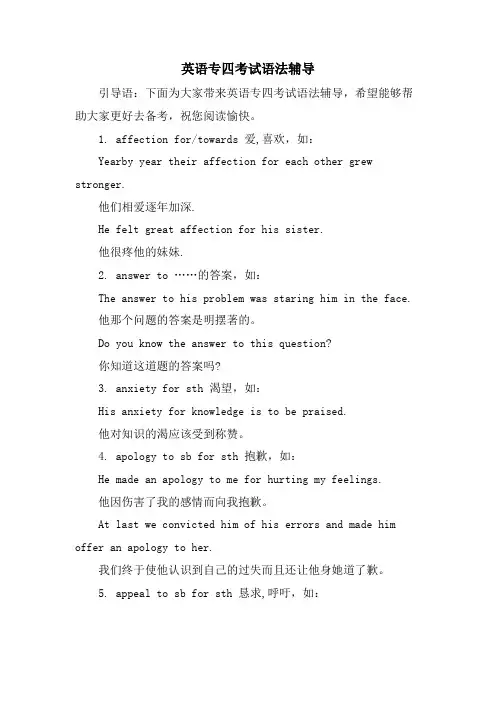
英语专四考试语法辅导引导语:下面为大家带来英语专四考试语法辅导,希望能够帮助大家更好去备考,祝您阅读愉快。
1. affection for/towards 爱,喜欢,如:Yearby year their affection for each other grew stronger.他们相爱逐年加深.He felt great affection for his sister.他很疼他的妹妹.2. answer to ……的答案,如:The answer to his problem was staring him in the face.他那个问题的答案是明摆著的。
Do you know the answer to this question?你知道这道题的答案吗?3. anxiety for sth 渴望,如:His anxiety for knowledge is to be praised.他对知识的渴应该受到称赞。
4. apology to sb for sth 抱歉,如:He made an apology to me for hurting my feelings.他因伤害了我的感情而向我抱歉。
At last we convicted him of his errors and made him offer an apology to her.我们终于使他认识到自己的过失而且还让他身她道了歉。
5. appeal to sb for sth 恳求,呼吁,如:The pany is prepared to trade off its up-market image against a stronger appeal to teenage buyers.该公司拟改变只售高档商品的形像, 以吸引青少年顾客.His lawyer decided to take an appeal to a higher court.他的律师决定向高一级法院上诉。
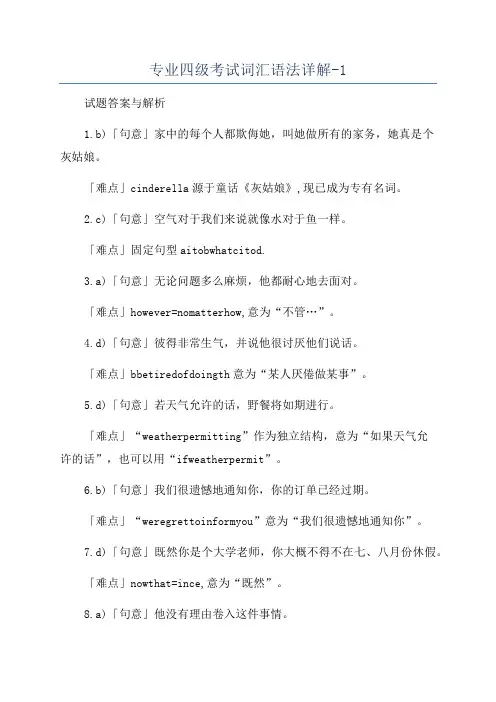
专业四级考试词汇语法详解-1试题答案与解析1.b)「句意」家中的每个人都欺侮她,叫她做所有的家务,她真是个灰姑娘。
「难点」cinderella源于童话《灰姑娘》,现已成为专有名词。
2.c)「句意」空气对于我们来说就像水对于鱼一样。
「难点」固定句型aitobwhatcitod.3.a)「句意」无论问题多么麻烦,他都耐心地去面对。
「难点」however=nomatterhow,意为“不管…”。
4.d)「句意」彼得非常生气,并说他很讨厌他们说话。
「难点」bbetiredofdoingth意为“某人厌倦做某事”。
5.d)「句意」若天气允许的话,野餐将如期进行。
「难点」“weatherpermitting”作为独立结构,意为“如果天气允许的话”,也可以用“ifweatherpermit”。
6.b)「句意」我们很遗憾地通知你,你的订单已经过期。
「难点」“weregrettoinformyou”意为“我们很遗憾地通知你”。
7.d)「句意」既然你是个大学老师,你大概不得不在七、八月份休假。
「难点」nowthat=ince,意为“既然”。
8.a)「句意」他没有理由卷入这件事情。
「难点」getting为get的现在分词形式,与mi某edup构成现在分词短语,修饰buine,作定语。
9.b)「句意」每个人都要遵守规则,主任也不例外。
「难点」but=e某cept,notbut意为“不除……之外”。
10.a)「句意」岩石的纹理结构被描述为“像糖”。
「难点」bedecribeda意为“被形容为”。
11.a)「句意」儿童饿死这一话题太无情,不该拿来开玩笑。
「难点」grim意为“无情的,冷酷的,可怕的”;grief是名词,意为“悲伤,悲痛”;hre wd意为“机灵的,精明的”;nobbih意为“势力的,媚上欺下的”。
12.c)「句意」我们不能对这些反对意见不予理睬。
「难点」hrugoff意为“对…满不在乎,对…不屑一顾”;wardoff意为“避开,挡开,避免”;layoff意为“停止打扰;不理会;戒绝”;hakeoff意为“抖落,摆脱”。
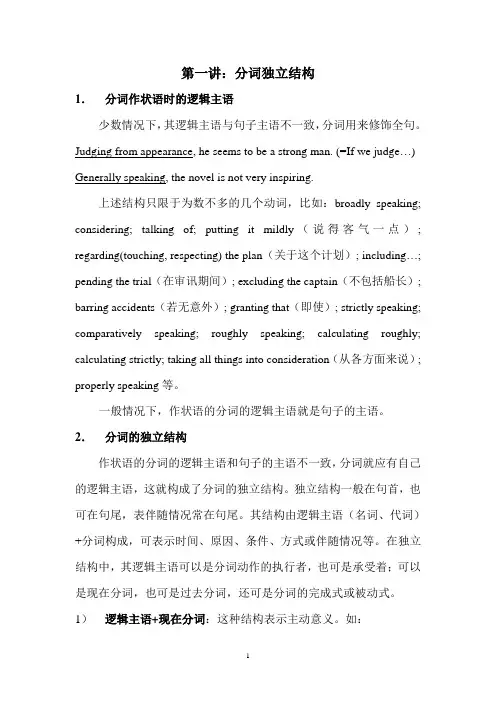
第一讲:分词独立结构1.分词作状语时的逻辑主语少数情况下,其逻辑主语与句子主语不一致,分词用来修饰全句。
Judging from appearance, he seems to be a strong man. (=If we judge…) Generally speaking, the novel is not very inspiring.上述结构只限于为数不多的几个动词,比如:broadly speaking; considering; talking of; putting it mildly(说得客气一点); regarding(touching, respecting) the plan(关于这个计划); including…; pending the trial(在审讯期间); excluding the captain(不包括船长); barring accidents(若无意外); granting that(即使); strictly speaking; comparatively speaking; roughly speaking; calculating roughly; calculating strictly; taking all things into consideration(从各方面来说); properly speaking等。
一般情况下,作状语的分词的逻辑主语就是句子的主语。
2.分词的独立结构作状语的分词的逻辑主语和句子的主语不一致,分词就应有自己的逻辑主语,这就构成了分词的独立结构。
独立结构一般在句首,也可在句尾,表伴随情况常在句尾。
其结构由逻辑主语(名词、代词)+分词构成,可表示时间、原因、条件、方式或伴随情况等。
在独立结构中,其逻辑主语可以是分词动作的执行者,也可是承受着;可以是现在分词,也可是过去分词,还可是分词的完成式或被动式。
1)逻辑主语+现在分词:这种结构表示主动意义。
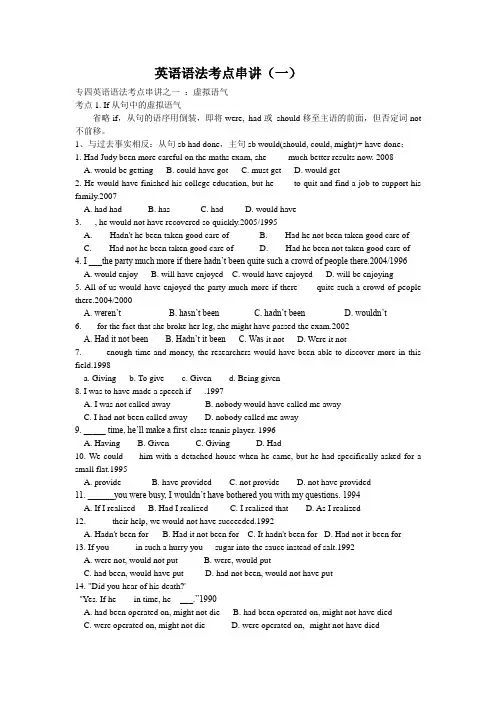
英语语法考点串讲(一)专四英语语法考点串讲之一:虚拟语气考点1. If从句中的虚拟语气省略if,从句的语序用倒装,即将were, had或should移至主语的前面,但否定词not 不前移。
1、与过去事实相反:从句sb had done,主句sb would(should, could, might)+ have done;1. Had Judy been more careful on the maths exam, she ____ much better results now. 2008A. would be gettingB. could have gotC. must getD. would get2. He would have finished his college education, but he ____to quit and find a job to support his family.2007A. had hadB. hasC. hadD. would have3.___, he would not have recovered so quickly.2005/1995A. Hadn't he been taken good care ofB. Had he not been taken good care ofC. Had not he been taken good care ofD. Had he been not taken good care of4. I ___the party much more if there hadn’t been quite such a crowd of people there.2004/1996A. would enjoyB. will have enjoyedC. would have enjoyedD. will be enjoying5. All of us would have enjoyed the party much more if there ___ quite such a crowd of people there.2004/2000A. weren’tB. hasn’t beenC. hadn’t beenD. wouldn’t6. ___for the fact that she broke her leg, she might have passed the exam.2002A. Had it not beenB. Hadn’t it beenC. Was it notD. Were it not7. _____enough time and money, the researchers would have been able to discover more in this field.1998a. Givingb. To givec. Givend. Being given8. I was to have made a speech if___.1997A. I was not called awayB. nobody would have called me awayC. I had not been called awayD. nobody called me away9. _____ time, he’ll make a first-class tennis player. 1996A. HavingB. GivenC. GivingD. Had10. We could ___him with a detached house when he came, but he had specifically asked for a small flat.1995A. provideB. have providedC. not provideD. not have provided11. ______you were busy, I wouldn’t have bothered you with my questions. 1994A. If I realizedB. Had I realizedC. I realized thatD. As I realized12. _____ their help, we would not have succeeded.1992A. Hadn't been forB. Had it not been forC. It hadn't been forD. Had not it been for13. If you _____ in such a hurry you sugar into the sauce instead of salt.1992A. were not, would not putB. were, would putC. had been, would have putD. had not been, would not have put14. "Did you hear of his death?'"Yes. If he ___ in time, he ___.‖1990A. had been operated on, might not dieB. had been operated on, might not have diedC. were operated on, might not dieD. were operated on,- might not have died2、与现在事实相反:从句sb did(were),主句sb would(should, could, might)+do;1. If there were no subjunctive mood, English _____ much easier to learn.2009A. could have beenB. would beC. will beD. would have been2. ―You ______ borrow my notes provided you take care of them,‖ I told my friend. 2007A. couldB. shouldC. mustD. can3. If you explained the situation to your solicitor, he ________ able to advise you much better thanI can.2005A. would beB. will have beenC. wasD. Were4. If I knew Japanese , I ______ for the position.1991A. would applyB. will applyC. may have appliedD. will have applied3、与将来事实相反:从句sb did (should+do或were+to do),主句sb would (should, could, might)+do。
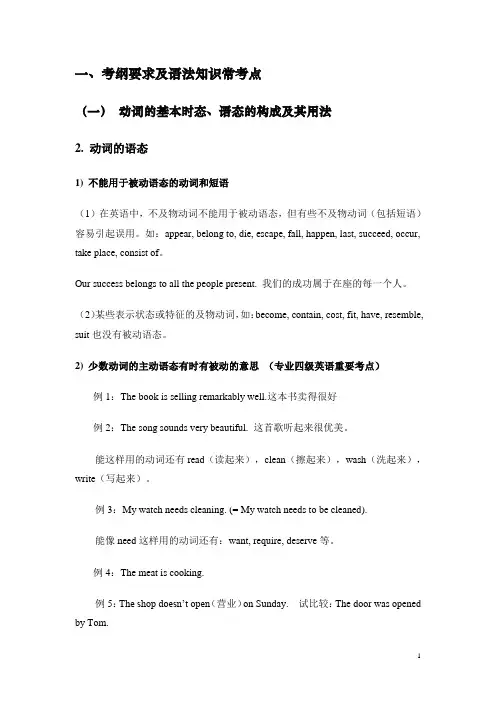
一、考纲要求及语法知识常考点(一)动词的基本时态、语态的构成及其用法2. 动词的语态1) 不能用于被动语态的动词和短语(1)在英语中,不及物动词不能用于被动语态,但有些不及物动词(包括短语)容易引起误用。
如:appear, belong to, die, escape, fall, happen, last, succeed, occur, take place, consist of。
Our success belongs to all the people present. 我们的成功属于在座的每一个人。
(2)某些表示状态或特征的及物动词,如:become, contain, cost, fit, have, resemble, suit也没有被动语态。
2) 少数动词的主动语态有时有被动的意思(专业四级英语重要考点)例1:The book is selling remarkably well.这本书卖得很好例2:The song sounds very beautiful. 这首歌听起来很优美。
能这样用的动词还有read(读起来),clean(擦起来),wash(洗起来),write(写起来)。
例3:My watch needs cleaning. (= My watch needs to be cleaned).能像need这样用的动词还有:want, require, deserve等。
例4:The meat is cooking.例5:The shop doesn’t open(营业)on Sunday. 试比较:The door was opened by Tom.3) 注意几个基本句型.(专业四级英语重要考点)It is said …(据说).,It is reported …(据报道), It is widely believed(人们广泛认为); It is expected …(据期望,应该)It is estimated…. ( 据估计), It was said…, It was believed … It was thought …( 以前人们认为...)。

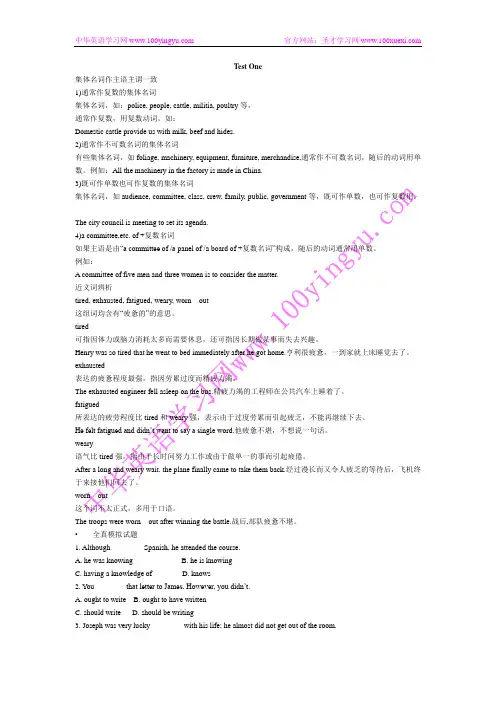
Test One集体名词作主语主谓一致1)通常作复数的集体名词集体名词,如:police, people, cattle, militia, poultry等,通常作复数,用复数动词。
如:Domestic cattle provide us with milk, beef and hides.2)通常作不可数名词的集体名词有些集体名词,如foliage, machinery, equipment, furniture, merchandise,通常作不可数名词,随后的动词用单数。
例如:All the machinery in the factory is made in China.3)既可作单数也可作复数的集体名词集体名词,如audience, committee, class, crew, family, public, government等,既可作单数,也可作复数用。
The city council is meeting to set its agenda.4)a committee,etc. of +复数名词如果主语是由“a committee of /a panel of /a board of +复数名词”构成,随后的动词通常用单数。
例如:A committee of five men and three women is to consider the matter.近义词辨析tired, exhausted, fatigued, weary, worn out这组词均含有“疲惫的”的意思。
tired可指因体力或脑力消耗太多而需要休息,还可指因长期做某事而失去兴趣。
Henry was so tired that he went to bed immediately after he got home.亨利很疲惫,一到家就上床睡觉去了。
exhausted表达的疲惫程度最强,指因劳累过度而精疲力竭。
专业四级考试词汇语法详解-1英语的演变是一个很有意思的过程,四级英语中有很多词汇都是有很有意思的“背景”,比如缩写可以会变成另外一个意思,那么关于它们究竟是怎么样的,在语法中又该如何使用呢? 我们一起来看看,以下是小编给大家整理的专业四级考试词汇语法详解-1,希望可以帮到大家试题答案与解析??1. b)「句意」家中的每个人都欺侮她,叫她做所有的家务,她真是个灰姑娘。
?「难点」cinderella源于童话《灰姑娘》,现已成为专有名词。
?2. c)「句意」空气对于我们来说就像水对于鱼一样。
?「难点」固定句型a is to b what c is to d.?3. a)「句意」无论问题多么麻烦,他都耐心地去面对。
?「难点」however=no matter how, 意为“不管…”。
?4. d)「句意」彼得非常生气,并说他很讨厌他们说话。
?「难点」sb be tired of doing sth意为“某人厌倦做某事”。
?5. d)「句意」若天气允许的话,野餐将如期进行。
?「难点」“weather permitting”作为独立结构,意为“如果天气允许的话”,也可以用“if weather permits”。
?6. b)「句意」我们很遗憾地通知你,你的订单已经过期。
?「难点」“we regret to inform you”意为“我们很遗憾地通知你”。
7. d)「句意」既然你是个大学老师,你大概不得不在七、八月份休假。
?「难点」now that=since, 意为“既然”。
?8. a)「句意」他没有理由卷入这件事情。
?「难点」getting为get的现在分词形式,与mixed up构成现在分词短语,修饰business,作定语。
?9. b)「句意」每个人都要遵守规则,主任也不例外。
?「难点」but=except,not but意为“不除……之外”。
?10. a)「句意」岩石的纹理结构被描述为“像糖”。
?「难点」be described as 意为“被形容为”。
英语专业四级语法专题讲解英语专业四级考试对于语法知识的要求非常高,只有掌握了扎实的语法基础,才能够在考试中取得好成绩。
本文将针对英语专业四级考试中常见的语法问题进行分析和讲解,帮助考生更好地应对考试。
一、时态时态是英语语法中的基础知识,常出现在四级考试的试题中。
英语中常见的时态有一般现在时、一般过去时、一般将来时、现在进行时、过去进行时、现在完成时等,每种时态都有其特定的用法和表示方式。
1. 一般现在时一般现在时表示经常性或习惯性的动作,也可以表示客观事实等。
例句1:I usually get up at 7 o'clock in the morning.例句2:Water boils at 100 degrees Celsius.2. 一般过去时一般过去时表示在过去某个时间发生的动作或存在的状态。
例句1:I watched a movie last night.例句2:He lived in Paris for two years.3. 一般将来时一般将来时表示将要发生的动作或存在的状态,常与表示将来的时间状语连用。
例句1:I will visit my grandparents next weekend.例句2:She is going to travel around the world after graduation.4. 现在进行时现在进行时表示现在正在进行的动作。
例句1:They are studying in the library now.例句2:I am reading a book at the moment.5. 过去进行时过去进行时表示过去某个时间正在进行的动作。
例句1:She was cooking dinner when I arrived home.例句2:I saw him while he was walking in the park.6. 现在完成时现在完成时表示过去发生的动作对现在造成的影响或结果。